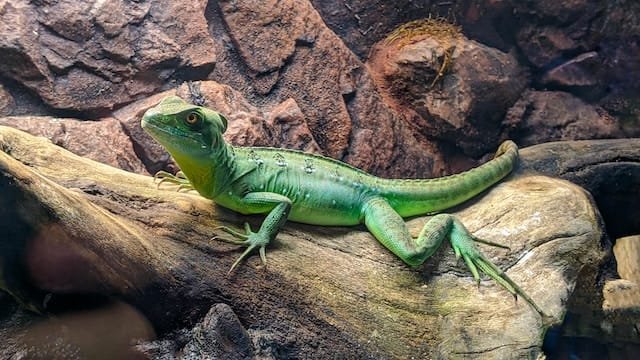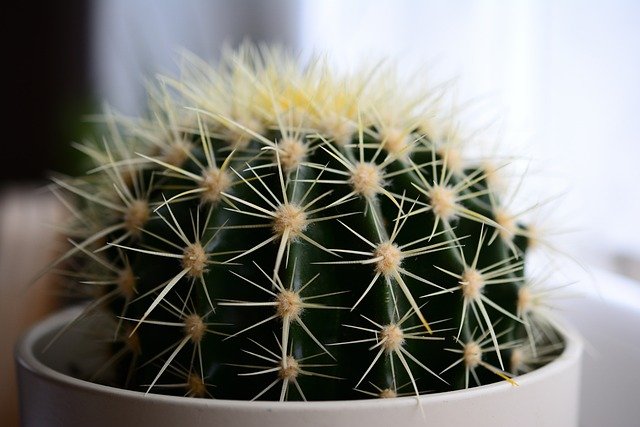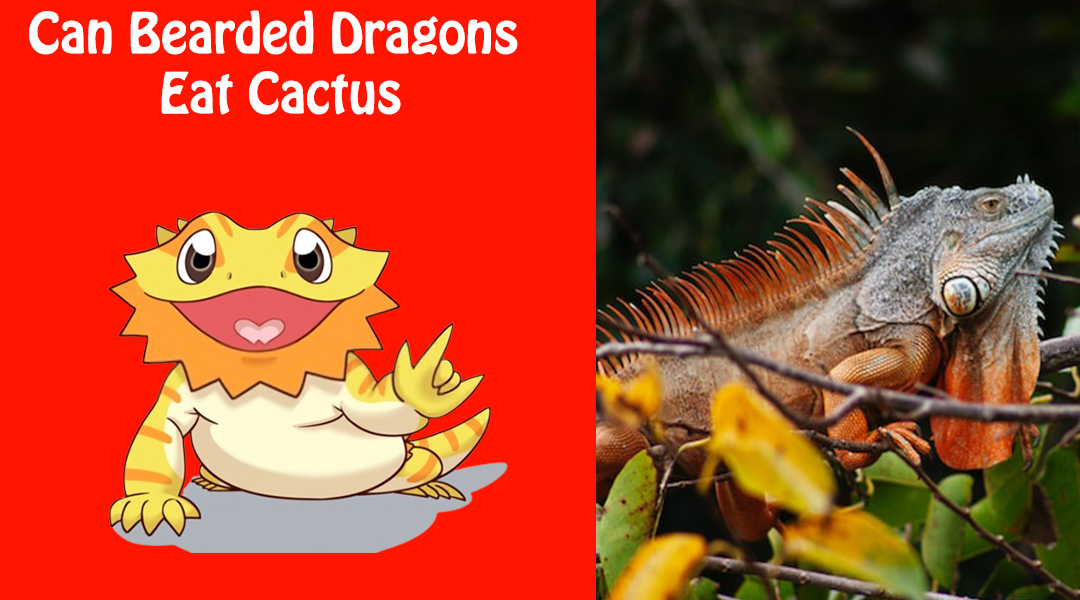Bearded dragons are a popular pet reptile that require a balanced diet to maintain their health and wellbeing. As omnivores, they can eat a variety of foods including insects, fruits, vegetables, and even some flowers. However, many owners may wonder if cactus is a safe and appropriate food option for their bearded dragon.
The short answer is yes, bearded dragons can eat cactus. In fact, some species of cactus such as prickly pear cactus can provide a nutritious and hydrating addition to a bearded dragon’s diet. However, it is important to prepare the cactus properly and feed it in moderation to avoid any potential health issues. In this article, we will explore the benefits and risks of feeding cactus to your bearded dragon and provide tips on how to safely incorporate it into their diet.

Understanding Bearded Dragons’ Diet
General Diet
As omnivores, bearded dragons eat a variety of food items including insects, vegetables, and fruits. A balanced diet is important to ensure that they receive all the necessary nutrients for their growth and development. Insects such as crickets, mealworms, and roaches are a staple in their diet, while vegetables like kale, collard greens, and carrots provide essential vitamins and minerals.
Special Dietary Needs
Bearded dragons have specific dietary requirements that must be met to maintain their health. For instance, they require a high calcium to phosphorus ratio to prevent metabolic bone disease. Additionally, they need a source of vitamin D3 to absorb calcium effectively. Since they are prone to dehydration, it is important to provide them with fresh water regularly.
When it comes to feeding bearded dragons, it is important to avoid certain foods that can be harmful to them. For example, avocado, rhubarb, and chocolate should never be given to bearded dragons as they contain toxic substances that can cause serious health problems.
Overall, a varied diet that includes a balance of insects, vegetables, and fruits is crucial for the health and well-being of bearded dragons. By understanding their dietary needs and avoiding harmful foods, we can ensure that our bearded dragons live a healthy and happy life.
Can Bearded Dragons Eat Cactus?
Bearded dragons are omnivorous reptiles and can eat a variety of fruits, vegetables, and insects. As a bearded dragon owner, you may be curious about whether or not your pet can eat cactus. In this section, we will explore the benefits and potential risks of feeding cactus to bearded dragons.
Benefits of Cactus
Cactus can be a nutritious addition to a bearded dragon’s diet. It is low in fat and calories, making it a great option for bearded dragons who need to lose weight. Cactus is also high in fiber, which can improve digestion and prevent constipation in bearded dragons.
In addition to its nutritional benefits, cactus can also provide bearded dragons with hydration. Cactus is made up of mostly water, which can help keep your bearded dragon hydrated and prevent dehydration.
Potential Risks
While cactus can be a nutritious addition to a bearded dragon’s diet, it is important to be aware of the potential risks. Cactus has spines that can cause injury to your bearded dragon’s mouth and digestive tract. It is important to remove all spines from the cactus before feeding it to your bearded dragon.
Another potential risk of feeding cactus to your bearded dragon is the high levels of oxalic acid it contains. Oxalic acid can bind to calcium, preventing it from being absorbed by your bearded dragon’s body. This can lead to calcium deficiency and metabolic bone disease.
Overall, while cactus can provide nutritional benefits to bearded dragons, it is important to be cautious and aware of the potential risks. If you choose to feed cactus to your bearded dragon, be sure to remove all spines and feed it in moderation.
How to Feed Cactus to Bearded Dragons
Preparation Methods
When feeding cactus to bearded dragons, it is important to prepare it properly to ensure that it is safe for your pet. Here are some methods for preparing cactus:
- Remove the spines: Cactus spines can be harmful to bearded dragons, so it is important to remove them before feeding. You can use a knife or vegetable peeler to carefully remove the spines.
- Peel the skin: The skin of the cactus can be tough and difficult to digest, so it is best to remove it before feeding. You can use a knife or vegetable peeler to carefully peel away the skin.
- Cut into small pieces: Bearded dragons have small mouths, so it is important to cut the cactus into small pieces that are easy for them to eat.
Feeding Frequency
While cactus can be a healthy addition to a bearded dragon’s diet, it should not be the only food they eat. Here are some guidelines for feeding cactus to your bearded dragon:
- Feed in moderation: Cactus should be fed in moderation as part of a balanced diet. Too much cactus can cause digestive issues.
- Offer variety: Bearded dragons need a variety of foods to stay healthy. Offer a mix of vegetables, fruits, and insects along with cactus.
- Monitor for any adverse reactions: As with any new food, it is important to monitor your bearded dragon for any adverse reactions. If you notice any vomiting, diarrhea, or other symptoms, stop feeding cactus and consult with a veterinarian.
By following these preparation methods and feeding guidelines, you can safely incorporate cactus into your bearded dragon’s diet.

Alternatives to Cactus for Bearded Dragons
While cactus can be a healthy addition to a bearded dragon’s diet, it’s not the only option. Here are some alternatives to consider:
Vegetables
Bearded dragons can benefit from a variety of vegetables in their diet. Some good options include:
- Collard greens
- Mustard greens
- Turnip greens
- Kale
- Dandelion greens
- Endive
- Escarole
- Squash
- Carrots
It’s important to note that some vegetables, such as spinach and broccoli, should be fed in moderation due to their high oxalate content.
Fruits
Fruits can also be a great addition to a bearded dragon’s diet, but they should be fed sparingly due to their high sugar content. Some good options include:
- Apples
- Berries
- Mango
- Papaya
- Melon
- Grapes
- Kiwi
- Pears
Insects
Insects are a staple of a bearded dragon’s diet and should make up the majority of their food intake. Some good options include:
- Crickets
- Dubia roaches
- Mealworms
- Superworms
- Black soldier fly larvae
It’s important to gut load insects before feeding them to your bearded dragon to ensure they are getting the proper nutrients.
Commercial Diets
There are also commercial diets available specifically for bearded dragons. These diets are formulated to provide a balanced diet and can be a convenient option for busy owners. However, it’s important to read the ingredients list and ensure the diet is appropriate for your bearded dragon’s specific needs.
Overall, while cactus can be a healthy addition to a bearded dragon’s diet, there are plenty of alternatives available to ensure they are getting the proper nutrition.
Conclusion
In conclusion, while bearded dragons can eat cactus, it is not recommended as a regular part of their diet.
Cactus can be a good source of hydration for bearded dragons, but it should be given in moderation and only as a supplement to their main diet of insects and vegetables. The high fiber content in cactus can also cause digestive issues if overfed.
It is important to note that not all types of cactus are safe for bearded dragons to eat. The prickly spines and tough exterior of some cactus varieties can cause harm to the bearded dragon’s mouth, throat, and digestive tract.
Overall, it is best to stick to a well-balanced diet for your bearded dragon, including a variety of insects, leafy greens, and vegetables. If you do choose to offer cactus as a treat, make sure to prepare it properly and only offer it in small amounts. As always, consult with a veterinarian or reptile specialist for guidance on your bearded dragon’s diet.

Frequently Asked Questions
Where can I buy Cactus pads?
Cactus pads can be found in most grocery stores and markets that sell fresh produce. They are also available at specialty stores that sell exotic fruits and vegetables. If you are unable to find them in your local area, they can be purchased online from various retailers.
Where to Buy Prickly Pear Cactus?
Prickly pear cactus can be found in many nurseries and garden centers. They are also available at specialty stores that sell exotic plants. If you are unable to find them in your local area, they can be purchased online from various retailers.
Cactus pads for sale?
Cactus pads are sold in many grocery stores and markets that sell fresh produce. They are also available at specialty stores that sell exotic fruits and vegetables. If you are unable to find them in your local area, they can be purchased online from various retailers.
Can lizards eat cactus?
Yes, lizards can eat cactus. Cactus pads are a good source of hydration and nutrients for many species of lizards. However, it is important to remove the spines from the cactus pads before feeding them to your lizard.
Do bearded dragons eat prickly pear cactus?
Yes, bearded dragons can eat prickly pear cactus. It is a good source of hydration and nutrients for them. However, it is important to remove the spines from the cactus pads before feeding them to your bearded dragon.
What plants are poisonous to bearded dragons?
There are many plants that are poisonous to bearded dragons, including avocado, rhubarb, and tomato plants. It is important to research any plants before feeding them to your bearded dragon to ensure that they are safe to eat.

I, Mark Antonelli am highly interested in pet care tips. The experiences I gained through university life in animal sciences were also helpful to identify the best tricks for caring for and feeding varying kinds of pets. I know the majority of people love to own a pet. Yet, there is a guilty of owing a Bearded Dragon due to a lack of information about how much friendly and peaceful they are. I thought of filling this gap with detailed writings about this Pogona genus Bearded Dragon. All my team is also giving me great support to fulfil my mission. Hope you will enjoy the journey with us.

